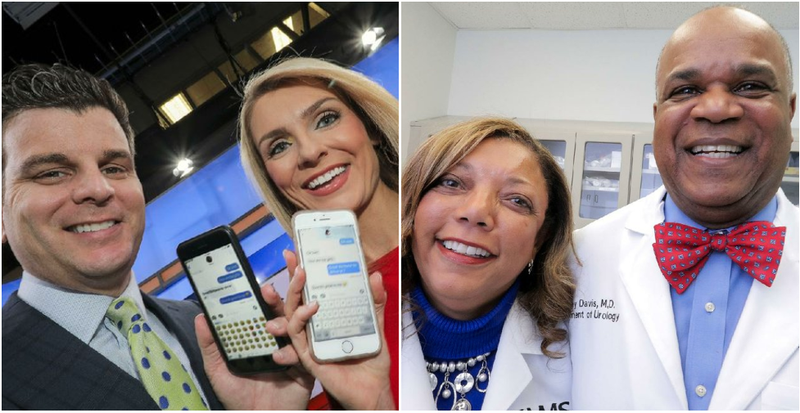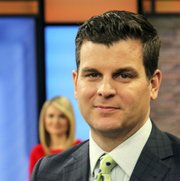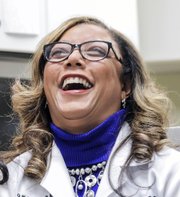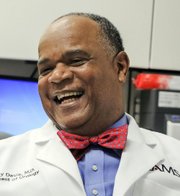Here are two married couples.
One met in a TV newsroom on Halloween 2008. They got married in 2010. The other couple's first encounter was at an Army base in 1979. They've been married since 1980.
Each couple has two children. One couple is made up of two doctors. The other pair are television news anchors. Both couples live in Little Rock, although their careers have taken them to other places.
Their jobs have also kept them apart. During a typical workweek, the news anchors see each other about an hour a day. The doctors spent months living separately over the course of their 38-year-marriage.
Like so many husbands and wives, they don't live 9 to 5, but they still make their marriages work.
...
It is summer 1979, and Rodney Davis is a medical student at the University of Arkansas for Medical Sciences. The Malvern native is part of the Health Professions Scholarship Program, with the Army paying for his education in return for his service later. He is on reserve duty at Fort Leonard Wood in Missouri and it is there that he meets another scholarship program medical student, Gloria Richard.
"I said, 'Hey, she's not so bad,'" Davis says, laughing.
He is Dr. Rodney Davis now, chair of the department of urology at UAMS, and is speaking in a small office at the sprawling hospital on a Friday afternoon earlier this month. With him is Dr. Gloria Richard-Davis, an OB-GYN, the division director for reproductive endocrinology and infertility and medical director for the physician assistant program at UAMS. She's the medical student he fell for almost 40 years ago.
So smitten was Davis that he eventually transferred to Tulane to be near the Louisiana native, who attended Louisiana State University School of Medicine in New Orleans.
"He's persistent," Richard-Davis says.
"I couldn't get her to come to Arkansas," Davis says with a laugh.
There is lots of laughter from them both throughout the interview as they recall their life together, a life that at times has found them living at opposite ends of the country and the globe.
Like in 1986, when she was sent to Fort Bragg, N.C., and he was finishing his residency at Fort Lewis in Washington. For a year, they lived with most of America between them, flying to see each other every six weeks or so.
They were together for two years while stationed in Seoul, South Korea, and they returned to Madigan Army Medical Center at Fort Lewis in Washington.
Richard-Davis' paperwork to leave the Army was filed when the Persian Gulf War broke out in 1990 and, while she left the service and went into private practice in Tacoma, Wash., Davis was still enlisted and was sent to Iraq.
"There was no need in both of us going and getting shot at," he says.
As do so many military families, they relied on rare phone calls over the eight months he was "down range."
After that tour, the couple spent time in Michigan, where he was on the faculty at the University of Michigan, and Richard-Davis took a fellowship at Wayne State University in Detroit.
They lived apart again when he worked on his fellowship at the University of Texas MD Anderson Cancer Center in Houston while she worked at Tulane University School of Medicine in New Orleans.
"For two years, we commuted between Houston and New Orleans," Richard-Davis says.
Their children, twins Morgan and Madison, were born in 1999 and experienced seeing their father leave for more deployments, including during the war in Iraq. (He retired as a colonel from the Army Reserves in 2008 after a total of 30 years of service).
"It's tough because you're basically living a single life married," says Richard-Davis of the time they spent apart. "Your friends are in different groups. Married people hang with married people. Single people hang with single people. Where do you fall?"
A question comes up, something along the lines of, "When were things ever normal for y'all," and Davis shakes his head.
"What is normal?" he asks. "I think that's the thing that really sort of disrupts people. They think there is a normal. The normal is what makes things work for you. If you try to pigeonhole yourself into what you perceive as normal, then it creates more chaos.
"You have to be flexible."
After the twins were born there were nannies and lots of family to help. Richard-Davis, the youngest of 13, had sisters and other kin pitching in.
"There is always a sister who will pick up and come stay," Davis says.
Richard-Davis turned to her older sister in Baton Rouge when she and the children fled New Orleans as Hurricane Katrina bore down on the city in August 2005. (Davis was at a medical conference in Amsterdam when his family was evacuated from New Orleans).
Help from family is also crucial for Aaron Nolan and his wife, Ashley Ketz, whose on-air schedules at Little Rock's KARK-TV are pretty much polar opposites. His workday starts around 4 a.m. and usually ends at 1 p.m., while hers starts at 2 p.m. and runs until around 11 p.m.
That's him co-anchoring the KARK 4 Today newscasts; she co-anchors the evening broadcasts.
While Nolan is on TV in the mornings, Ketz is making breakfast for their daughters, ages 3 and 2. In the afternoons and evenings, he's all Daddy Day Care, spending time with the girls. At dinner, she's often able to run home for a quick hour between newscasts, which is usually about the only time their paths cross during the workweek.
"It's a circus for that one hour," Ketz says in a conference room at KARK.
And sometimes, assistance is needed.
"We're lucky that we both have family close by," says Ketz, whose parents still live in Batesville, where she grew up. Nolan's family is in Maumelle. "We have to call in backup. We still have kids that get up in the middle of the night. They're toddlers, and sometimes you just need an extra set of hands."
They met in the KARK newsroom. Ketz was down from Fayetteville, where she worked at the CBS affiliate, on a job interview. She didn't get the position, but she did gain an admirer.
"My news director introduced me from across the room," Nolan says. "He said, 'Ashley, this is Eddie Munster,' because of my widow's peak.'"
Their first date was for lunch in Conway. The second was watching the Razorbacks beat Blake Griffin and the Oklahoma Sooners in Fayetteville.
That's when Nolan knew "it was destiny," he says.
They married in Rogers in 2010 and continued television work. There was a stretch, for about a year, when they had identical schedules at a Springfield, Mo., CBS station.
"Ashley was the evening anchor, and I had a 9-10 p.m. show. We loved it."
They both took spots at KARK in 2013, and their upside-down work lives began.
"There was no plan," Nolan says when asked if they had any formula worked out in advance. "What I've learned in this business, moving from weekend sports to news reporter to anchor to midday anchor to morning anchor, there are no plans. You roll with the punches and work as hard as you can."
Nolan, who is reporting this month from the Winter Olympics in South Korea, answers a question about the importance of communicating and then smiles at the sight of a text from Ketz on his phone.
"Any communication is important in our schedule," he says. "We always say, 'How was your night?' 'How did the girls do?' Anything we can do, that's important."
There are also advantages to a schedule like this, says Ketz, especially for parents with young children.
"One of us is always home. That was comforting as a new parent. We never knew how hard it was going to be to make it work, but that is still probably the biggest positive of having opposite schedules."
Cooperation and sharing household duties is key, and so is maintaining life as a couple.
"We couldn't function as a family if we both didn't give," Ketz says. "It's a full-time job when you're both working, you have a family and trying to have a relationship, too. Somewhere in there you have to find time for each other."
Charlie Simpson is a licensed marriage and family therapist and is the clinical director at the Arkansas Relationship Counseling Center in Little Rock. He has seen his share of couples who have to deal with long separations and wacky work schedules.
"It is challenging to maintain an emotional and physical connection when working odd schedules" he says.
Working on a friendship in the marriage is crucial.
"What we mean by friendship is keeping that fondness and admiration and continue to grow and know each other," Simpson says.
Richard-Davis mentions something along the same lines.
"Relationships are about shared values," she says at UAMS. "If you share the same values, if you are friends, that's the core of a good relationship. When you're young, you probably don't compromise as much, but you learn that through maturation."
"Respect," adds Davis. "That's a big emphasis, respect for the other and what they do."
Speaking of what they do, the Davises, Nolan and Ketz have the advantage of working in the same field.
"You have someone who understands what you're going through," Ketz says. "It works pretty well for us."
"Stress is a mean individual," Nolan says. "It's much easier when you have someone who understands what you're going through. Ashley and I do, without a doubt. We can fall back on each other."
"It's what we committed to," Davis says of their careers. "It's what you do. She understands that. We're going to have to get up in the middle of the night. She has to go deliver a baby, I know where she's going."
For the Davises, who have an almost empty nest (the twins are 18; one is at home, the other at college), they are under the same roof and maintain mostly similar schedules, treating patients and guiding residents and medical students at UAMS.
"We're accepting of the fact that we're passing through," Davis says, "and that we need to make sure we have people around that will be able to take care of the public ..."
"And us," Richard-Davis finishes, laughing.
Over at KARK, Ketz and Nolan keep juggling their on-air lives with their life together.
"We've been pretty blessed," Ketz says. "As odd as this schedule sounds, it works for us."
Style on 02/13/2018




